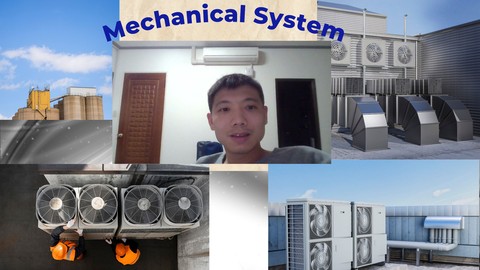
Semiconductor Mechanical System
Semiconductor Mechanical System, available at $39.99, with 19 lectures.
You will learn about Semiconductor Mechanical System Chilled Water System Air Handling Unit Water Cooled Chiller vs Air Cooled Chiller How Cooling Towers Work Counterflow vs Crossflow This course is ideal for individuals who are Semiconductor Mechanical System It is particularly useful for Semiconductor Mechanical System.
Enroll now: Semiconductor Mechanical System
Summary
Title: Semiconductor Mechanical System
Price: $39.99
Number of Lectures: 19
Number of Published Lectures: 19
Number of Curriculum Items: 19
Number of Published Curriculum Objects: 19
Original Price: $39.99
Quality Status: approved
Status: Live
What You Will Learn
- Semiconductor Mechanical System
- Chilled Water System
- Air Handling Unit
- Water Cooled Chiller vs Air Cooled Chiller
- How Cooling Towers Work Counterflow vs Crossflow
Who Should Attend
- Semiconductor Mechanical System
Target Audiences
- Semiconductor Mechanical System
A Semiconductor Mechanical System is a complex network of interconnected subsystems and equipment designed to provide the precise environmental conditions and material handling required for semiconductor manufacturing. This system plays a crucial role in ensuring the efficient and reliable production of semiconductor devices.
One of the key components of a Semiconductor Mechanical System is the Chilled Water System. This system is responsible for providing cooling to various process equipment and tools throughout the fabrication facility. The Chilled Water System typically includes the following elements:
Cooling Tower: The cooling tower is a heat rejection device that removes heat from the chilled water system by evaporative cooling. It transfers the heat from the chilled water to the atmosphere, allowing the water to be recirculated and cooled.
Air-Cooled cs Water-Cooled Chiller: The water-cooled chiller is a refrigeration system that uses water as the cooling medium. It is responsible for removing heat from the chilled water loop and maintaining the desired water temperature for the various process tools and equipment. The choice between a water-cooled chiller and an air-cooled chiller depends on several factors, such as the facility’s climate, available resources, and energy efficiency requirements. Water-cooled chillers are generally more efficient and have a higher cooling capacity, but they require a cooling tower and a water supply. Air-cooled chillers, on the other hand, do not require a cooling tower and can be a more suitable option in certain geographical regions or when water resources are limited.
Air Handling Unit (AHU): The Air Handling Unit is a critical component that conditions the air in the cleanroom environment. It controls the temperature, humidity, and air filtration to ensure the appropriate environmental conditions for the semiconductor manufacturing process.
Course Curriculum
Chapter 1: Introduction
Lecture 1: Introduction
Lecture 2: Exhaust System
Lecture 3: How Buffer Tanks Work & Sizing
Lecture 4: VAV vs Constant Volume Systems
Chapter 2: AHU Air Handling Unit
Lecture 1: AHU Air Handling Unit
Chapter 3: Cooling System
Lecture 1: Chilled Water System
Lecture 2: Refrigeration Cycle 101
Lecture 3: Indirect Evaporative Cooling Air-Cooled Chiller
Lecture 4: How Indirect Evaporative Cooling Works
Lecture 5: How do Evaporative Coolers Work
Lecture 6: Heat Pump – Cooling Mode
Chapter 4: Air Cooled Chiller vs Water Cooled Chiller
Lecture 1: Air Cooled Chiller vs Water Cooled Chiller
Lecture 2: Air-Cooled vs Water-Cooled Chillers and how they work with Air Handling Units
Lecture 3: Control Sequence with a Chiller
Chapter 5: Cooling Tower
Lecture 1: How Cooling Towers Work Counterflow vs Crossflow
Lecture 2: Cooling Tower Efficiency
Chapter 6: Adiabatic Cooling
Lecture 1: Adiabatic Cooling
Chapter 7: Evaporative Cooling
Lecture 1: How do Evaporative Coolers Work
Chapter 8: Summary
Lecture 1: Summary
Instructors
-
Leroy Lo
PMP
Rating Distribution
- 1 stars: 0 votes
- 2 stars: 0 votes
- 3 stars: 0 votes
- 4 stars: 0 votes
- 5 stars: 0 votes
Frequently Asked Questions
How long do I have access to the course materials?
You can view and review the lecture materials indefinitely, like an on-demand channel.
Can I take my courses with me wherever I go?
Definitely! If you have an internet connection, courses on Udemy are available on any device at any time. If you don’t have an internet connection, some instructors also let their students download course lectures. That’s up to the instructor though, so make sure you get on their good side!
You may also like
- Best Video Editing Courses to Learn in March 2025
- Best Music Production Courses to Learn in March 2025
- Best Animation Courses to Learn in March 2025
- Best Digital Illustration Courses to Learn in March 2025
- Best Renewable Energy Courses to Learn in March 2025
- Best Sustainable Living Courses to Learn in March 2025
- Best Ethical AI Courses to Learn in March 2025
- Best Cybersecurity Fundamentals Courses to Learn in March 2025
- Best Smart Home Technology Courses to Learn in March 2025
- Best Holistic Health Courses to Learn in March 2025
- Best Nutrition And Diet Planning Courses to Learn in March 2025
- Best Yoga Instruction Courses to Learn in March 2025
- Best Stress Management Courses to Learn in March 2025
- Best Mindfulness Meditation Courses to Learn in March 2025
- Best Life Coaching Courses to Learn in March 2025
- Best Career Development Courses to Learn in March 2025
- Best Relationship Building Courses to Learn in March 2025
- Best Parenting Skills Courses to Learn in March 2025
- Best Home Improvement Courses to Learn in March 2025
- Best Gardening Courses to Learn in March 2025






















